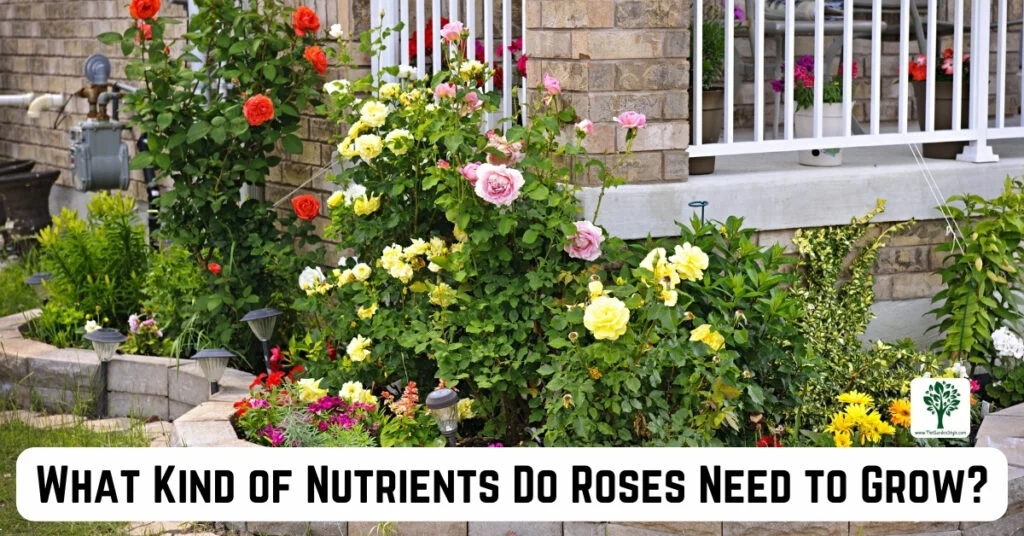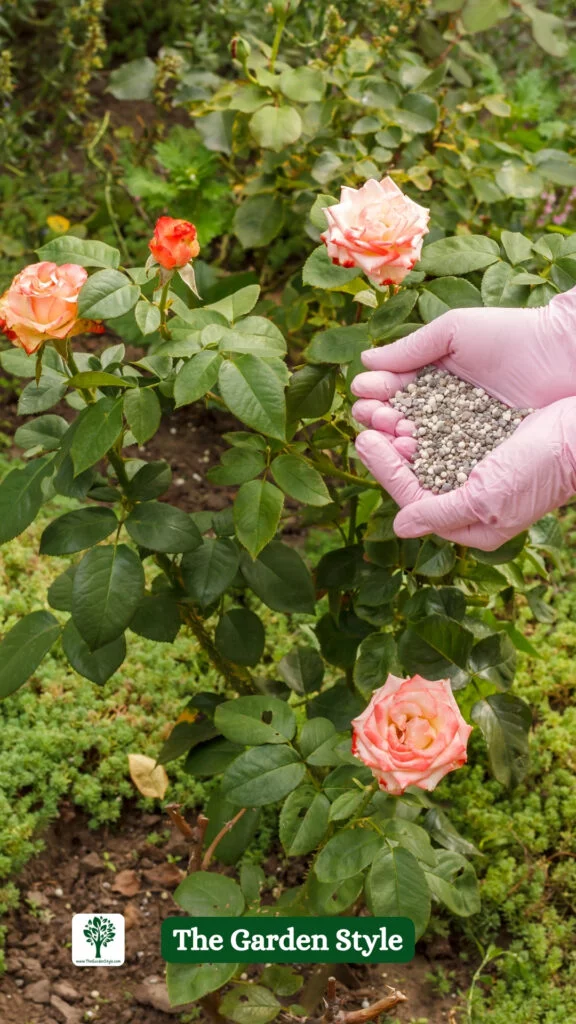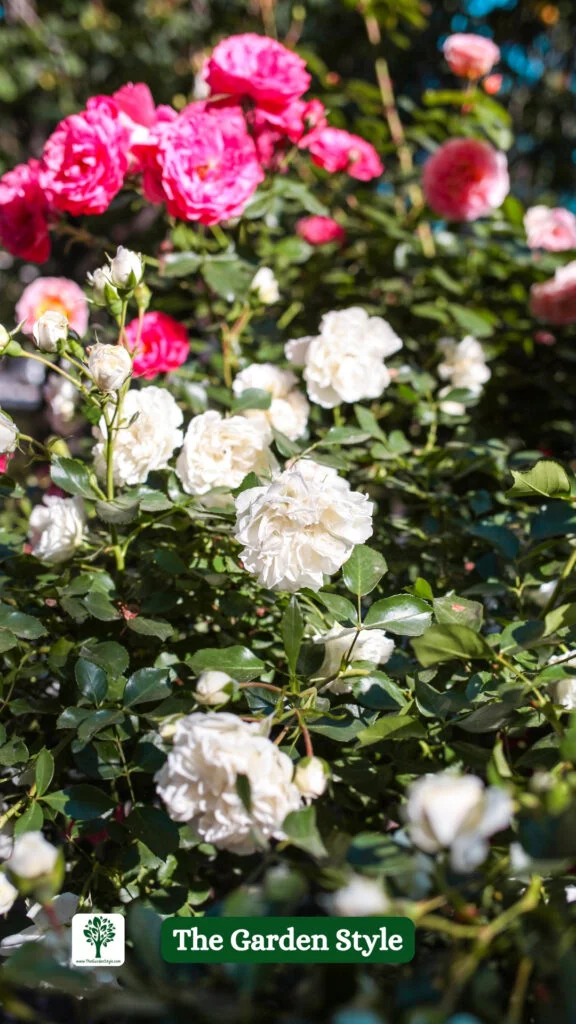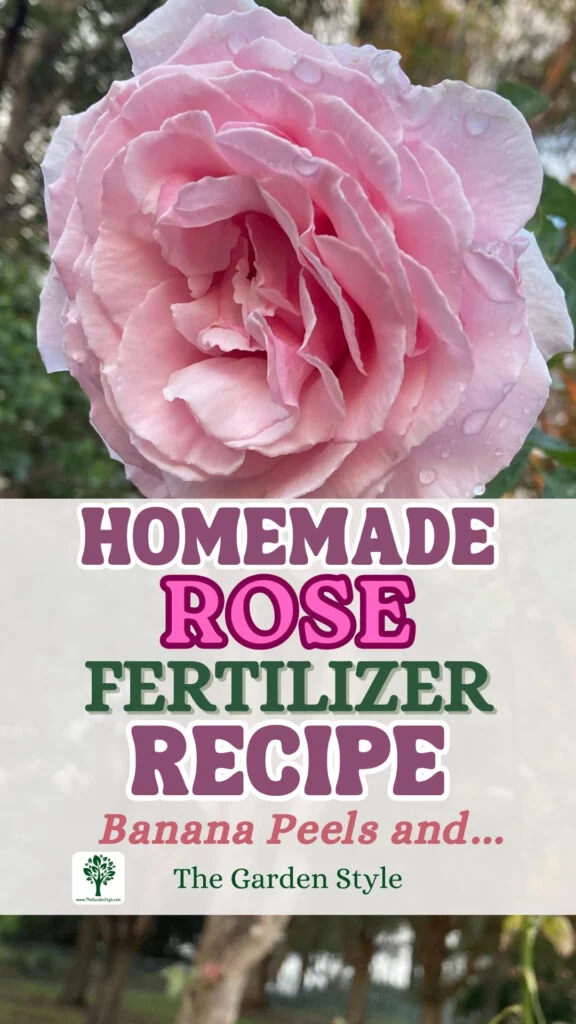Roses are the epitome of beauty and elegance in the garden, but they require proper care and nourishment to thrive. One crucial aspect of rose care is how to fertilize roses, which provides the essential nutrients these magnificent plants need to grow strong, produce abundant blooms, and resist pests and diseases. In this comprehensive guide, we’ll dive into the world of rose fertilization, exploring the specific nutrient needs of roses, the best types of fertilizers to use, and the optimal timing for application.
Table of Contents
What Kind of Nutrients Do Roses Need to Grow?

Roses require a balanced supply of essential nutrients to maintain their vibrant health and stunning appearance. The primary nutrients that roses need are nitrogen (N), phosphorus (P), and potassium (K), commonly referred to as the N-P-K ratio. Nitrogen promotes lush, green foliage growth, while phosphorus supports strong root development and healthy blooms. Potassium, on the other hand, enhances overall plant vigor and disease resistance.
In addition to these macronutrients, roses also benefit from secondary nutrients like calcium, magnesium, and sulfur, as well as micronutrients such as iron, boron, and zinc. These essential elements work together to promote overall plant health, from root growth to disease resistance and flower production.
Signs of Nutrient Deficiency in Roses
Recognizing the signs of nutrient deficiency is crucial to ensuring your roses receive the proper nourishment. Common indicators of nutrient deficiency include yellowing or discolored leaves, stunted growth, poor blooming, and increased susceptibility to pests and diseases. By addressing these issues promptly with the appropriate fertilizer, you can restore your roses to their former glory.
Recommended reading: Yellow Leaves on Roses – How to Fix
Types of Fertilizers for Roses

When it comes to fertilizing roses, you have several options to choose from. The most common types of fertilizers for roses include:
- Granular fertilizers: These slow-release fertilizers come in granular form and provide a steady supply of nutrients over an extended period.
- Water-soluble fertilizers: These liquid fertilizers dissolve in water and provide an immediate boost of nutrients to the plant.
- Organic fertilizers: Made from natural sources like compost, manure, or fish emulsions, organic fertilizers are a sustainable and eco-friendly option.
Organic vs. Inorganic Fertilizers
The debate between organic and inorganic fertilizers is ongoing, and the choice ultimately comes down to personal preference and gardening philosophy. Organic fertilizers are derived from natural sources and are generally considered more environmentally friendly, but they may release nutrients more slowly. Inorganic fertilizers, on the other hand, are synthetically produced and offer a more immediate release of nutrients.
Whichever route you choose, it’s essential to read and follow the manufacturer’s instructions carefully to ensure proper application rates and avoid over-fertilization, which can damage your roses.
When to Fertilize Roses?

In the initial growing season with your newly planted rose, it’s essential to nourish it exclusively with liquid fertilizers. Granular fertilizers should be avoided as their concentrated nutrients can scorch the delicate, immature roots, potentially leading to the demise of your precious rose bush. However, once your rose has successfully navigated its first year, you can alternate between administering liquid fertilizers every 4-6 weeks or employing granular formulations every 4 weeks throughout the active growing period.
Spring Fertilization
Spring is the ideal time to begin fertilizing your roses. As the plants emerge from dormancy, they require a boost of nutrients to support new growth and flower development. Apply a balanced fertilizer or a rose-specific formula in early spring, typically when the new shoots are about 6 inches tall.
Summer Fertilization
During the active growing season, roses benefit from regular fertilization to sustain their energy demands. Apply a well-balanced fertilizer every 4-6 weeks throughout the summer months, adjusting the frequency based on your roses’ performance and soil conditions.
Fall Fertilization
As autumn approaches, it’s essential to prepare your roses for the upcoming dormant period. Apply a final dose of fertilizer in late fall, focusing on a higher phosphorus content to promote root growth and overall plant hardiness. Avoid fertilizing too late in the season, as this can encourage new growth that may be damaged by frost.
Recommended reading: How And When to Prune Roses for Winter
What is The Best Fertilizer for Roses?
During the first year after planting your new rose bush, it’s crucial to provide the proper nourishment to establish a robust root system. For this initial growth stage, liquid fertilizers are the ideal choice. Look for a formulation specifically designed for roses, with an NPK ratio of around 2-3-0.2, which will deliver a balanced supply of nitrogen for lush foliage, phosphorus for strong roots, and a modest amount of potassium.
- All Natural
- Easy Application
- Won’t Burn Plants
Once your rose has weathered its inaugural season and entered its second year, you can alternate between liquid and granular fertilizers. For the second year, consider using a 15-10-10 granular fertilizer, which provides a higher level of nitrogen to promote vigorous growth and abundant blooms, along with sufficient phosphorus and potassium. This versatility allows you to cater to your rose’s evolving needs, ensuring a consistent flow of essential nutrients throughout the growing cycle.
- Bloom Booster
- Plant Fertilizer
- Rose Food
Homemade Rose Fertilizer Recipe
For gardening enthusiasts keen on crafting their own homemade fertilizer tailored specifically for roses, behold this recipe:
Ingredients:
- Banana peels
- Eggshells
- Epsom salt
- Water
Instructions:
- Collect banana peels and eggshells. Rinse the eggshells thoroughly and allow them to dry completely.
- Chop the banana peels into small pieces and crush the eggshells into fine powder.
- Combine the chopped banana peels and crushed eggshells in a container.
- Add a tablespoon of Epsom salt to the mixture.
- Fill the container with water and let the ingredients steep for several days to a week, stirring occasionally.
- After the mixture has steeped, strain out the solids and transfer the liquid fertilizer to a spray bottle or watering can.
- Dilute the fertilizer with water (about 1 part fertilizer to 4 parts water) before applying it to your roses.
- Use the homemade rose fertilizer to feed your roses every 2-4 weeks during the growing season for healthy, vibrant blooms.
How to Fertilize Roses Properly
Before applying any fertilizer, it’s essential to prepare the soil properly. Start by removing any debris or mulch from around the base of the plant, exposing the soil surface. Gently scratch the soil to loosen it and create a receptive environment for the fertilizer.
For granular fertilizers, sprinkle the recommended amount evenly around the base of the plant, extending outward to the drip line (the area where the outermost branches end). Avoid piling the fertilizer directly on the plant’s stem or crown, as this can cause damage.
When using liquid fertilizers, follow the manufacturer’s instructions carefully for mixing and application rates. Apply the solution evenly around the plant’s base, taking care not to saturate the foliage, which can lead to burning or other damage.
Watering After Fertilizing Roses
After applying fertilizer, it’s crucial to water the area thoroughly. That helps to dissolve and distribute the nutrients throughout the soil, making them readily available for the rose’s root system to absorb. Avoid fertilizing during periods of drought or extreme heat, as this can lead to nutrient burn and stress the plants further.
Frequently Asked Questions
Yes, you can fertilize roses while they’re blooming. Use a balanced fertilizer or one with higher phosphorus to support flowering. Ensure thorough watering afterward for optimal nutrient absorption.
Yes, over-fertilizing can lead to nutrient imbalances and damage to the plant. It’s crucial to follow recommended dosage guidelines and avoid excessive applications.
Newly planted roses benefit from a light application of fertilizer to support root establishment. However, it’s essential to avoid overwhelming them with excessive nutrients during this delicate phase.
Yes, compost can serve as an excellent organic fertilizer for roses, providing a slow-release source of nutrients and improving soil structure over time.
If this post about how to fertilize roses was helpful, please share it:




